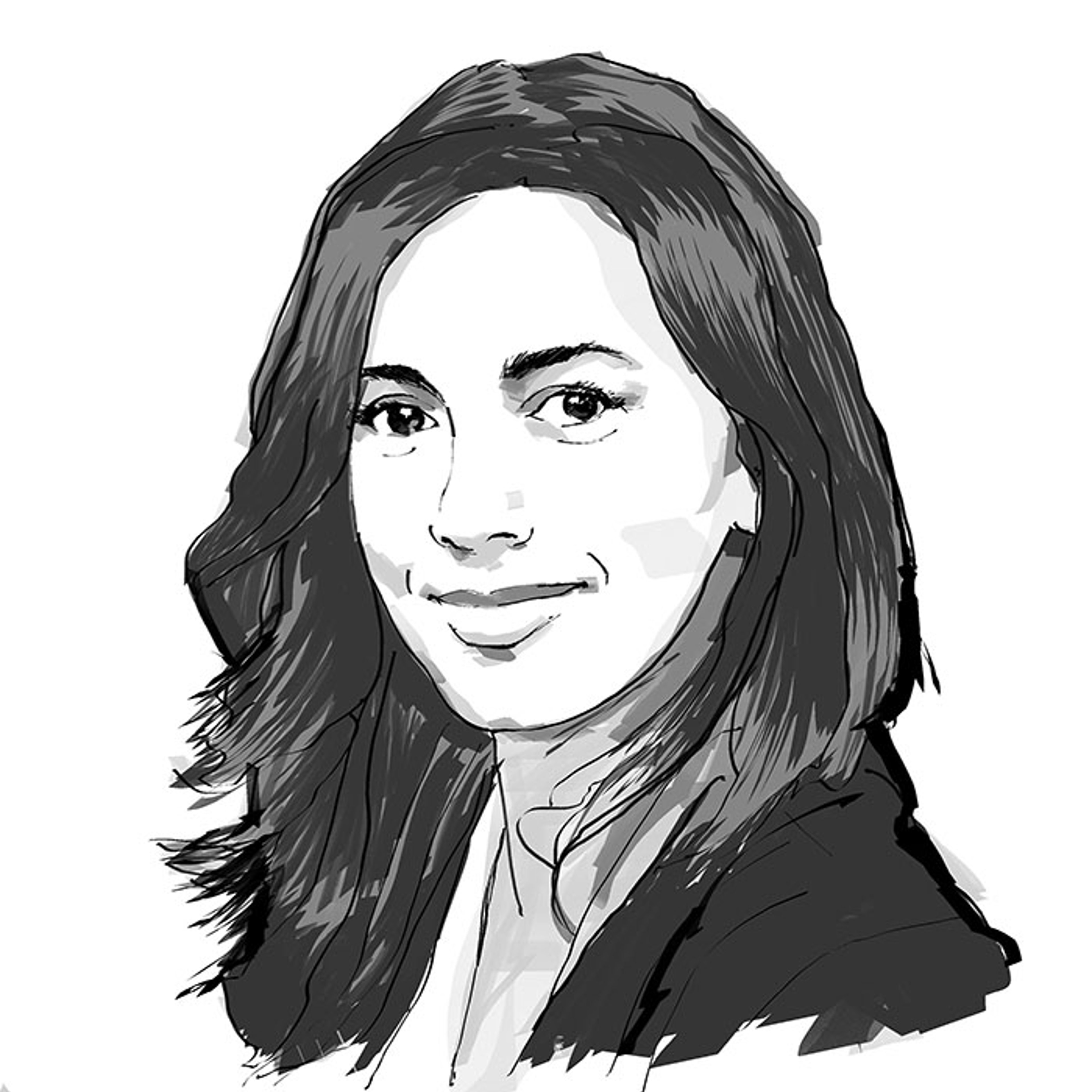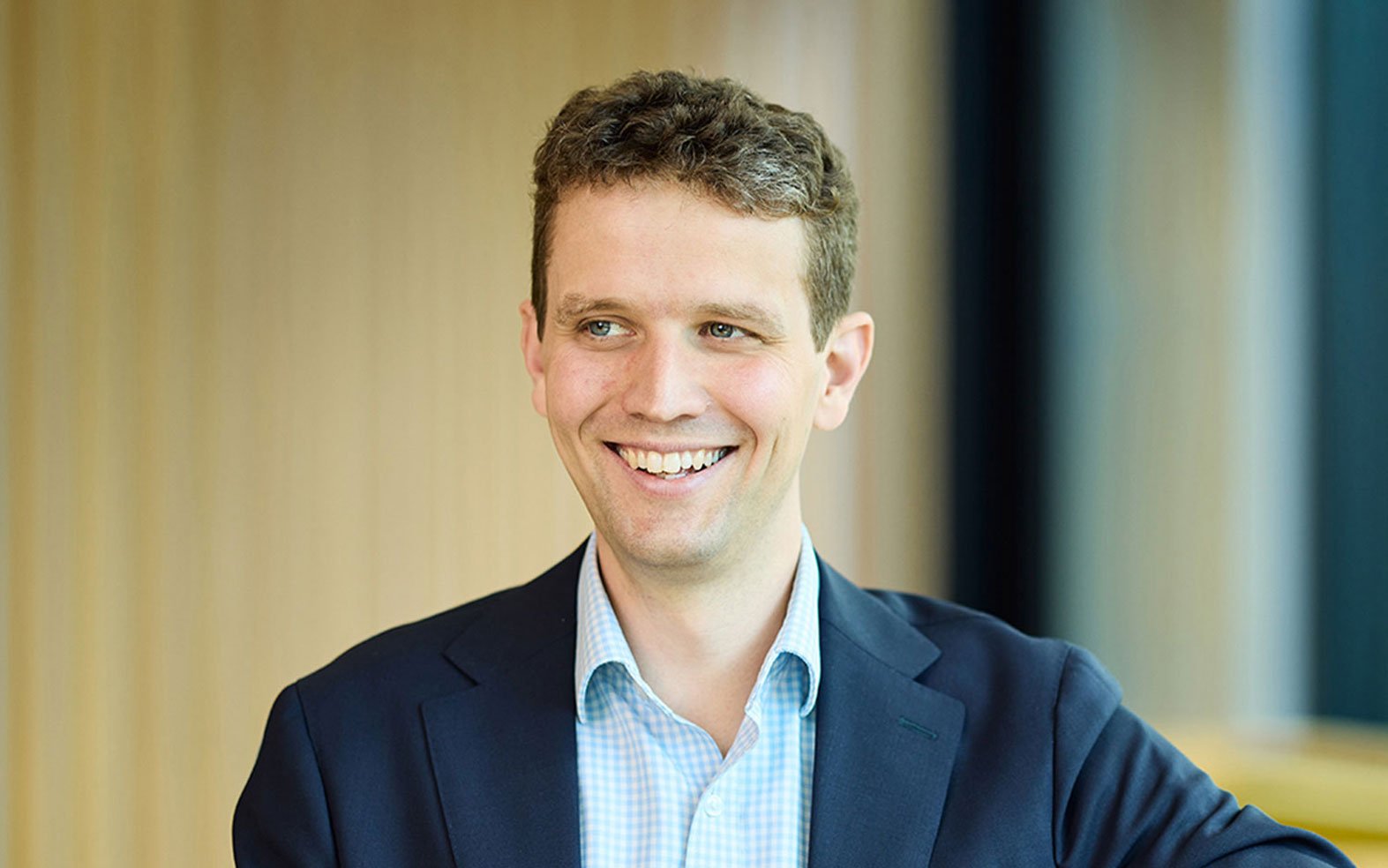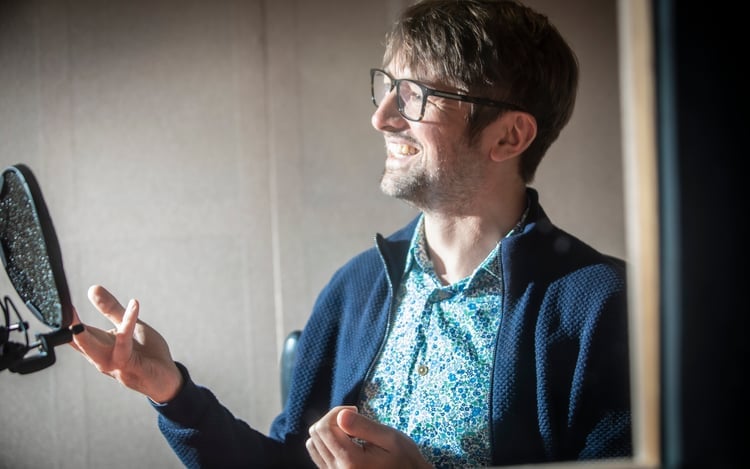
Prof Kate Crawford studies the social implications of artificial intelligence. Photography by Cath Muscat.
Kate Crawford knows of a secret that makes it impossible to see the latest chatbots and other artificial intelligence advances the same way.
The Australia-born professor recently surprised an Edinburgh Book Festival audience with news of a study “indicating that every time you have an exchange with ChatGPT, it's the equivalent of pouring out half a litre of fresh water onto the ground” because that’s what it takes to “cool the giant AI supercomputers” involved.
When we meet shortly afterwards, she highlights a further issue with the ‘large language models’ (LLMs) that let ChatGPT and other ‘generative’ AI tools create text, images and other human-like output.
“The energy difference from just doing a traditional search query to using a LLM is enormous,” she says. “Some research indicates it can be up to 1,000 times more energy intensive.”
And this brings us to the heart of the matter. While such claims are arresting, they are hard to verify or get more details about from the companies responsible.
“The question of the environmental cost of AI is the biggest secret in the industry right now,” Crawford explains.
“It’s incredibly difficult because it’s incredibly hard to find out very accurate numbers on exactly how much water is being used and from where and exactly how much energy and from which sources are coming – from dirty sources of energy or clean sources of energy?
“All along the pipeline – the hardware, the software, the energy, the water to cool the systems – we have enormous environmental costs that are not being fully shared with the public.”
Industry insider
It’s a striking observation from a contributor to the work of Microsoft Research’s lab in New York. Its parent company has invested billions of dollars in ChatGPT’s creator, OpenAI, and is in the process of rolling out generative AI across its Microsoft 365 suite of apps. Crawford works with a group of experts at the firm, drawing on learnings from sociology, anthropology and other fields to suggest ways computer-related technologies can be developed ethically and accountably.
But that’s just one of many plates the multi-talented scholar has spinning.
Crawford is a professor at the University Southern California Annenberg and the École Normale Supérieure in Paris. She has several electronica albums to her name. And she draws on both her artistic and academic temperaments to develop large-scale artworks illustrating AI’s complex dynamics. A notable example is the Anatomy of an AI System, which she created with another professor that visualises the human labour, data and natural resources needed to create an Amazon Echo smart speaker. The Metropolitan Museum of Modern Art in New York now has it on display, and it is also in the permanent collection of the UK’s V&A museums.
In 2021, Crawford published the book Atlas of AI: Power, Politics and the Planetary Costs of Artificial Intelligence. ChatGPT’s subsequent release has only amplified her concerns.
“If you're in this field right now, you probably haven't slept for six months,” she says.
“Anyone who was working in this space thought we had probably another decade, at least, until we got to this place. So the degree of rapid change has caught everybody by surprise, including the people building these models.”
Extractive technology
Speaking to Crawford, her fizzing intellect is apparent, but so too is her courage to speak out in an industry that doesn’t always take criticism kindly. Her description of AI as a “technology of extraction” must make some uncomfortable.
This refers to extracting the natural resources needed to create an AI system, ranging from the rare earths and other minerals mined from the ground to make semiconductors and other hardware to the energy and water consumption described above.
It also involves the extraction of human resources: data and labour.

Some data centres use renewable energy to reduce the environmental impact of carrying out AI and other computing tasks.
The data includes everything we have created and that has been created about us on the internet. That covers the creative labour of writers, artists, musicians and many others whose work has been taken, almost always without their knowledge or consent, to train the generative AI tools.
It also extends to the ‘hidden labour’ involved in the repetitive tasks some AI systems require, such as labelling huge amounts of training data, reviewing harmful content and testing the output. Many of these workers, Crawford writes, are scattered across the world and poorly compensated, often “paid pennies per microtask”.
“Everybody has a stake in this,” she tells me, “because these are systems that are built on something that we have all produced collectively.”
Transparency and accountability
Crawford believes there’s an urgent need for more transparency, but the opposite trend is unfolding.
“The history of the AI field has been one of openness,” she says. “All the conference papers are published in open journals. Anyone can read them. But we are now moving into a much more closed era and, I think, concerning period.”
National governments, the European Union, the G7 and the United Nations are all considering new laws and regulations to ensure companies and others deploy AI safely, ethically and in a trustworthy manner.
Crawford urges those involved to focus on how AI is “already accelerating a climate crisis [and] creating more economic inequality” rather than being distracted by the “boogeyman” of an out-of-control “Terminator risk scenario”.
“We have to start with transparency, and then we need accountability,” she says.
“These are going to be difficult diplomatic processes. But we’ve done it before [with nuclear technology]. We absolutely have to have the courage to do it again.”
Search v chatbot
Crawford also believes the public has a role to play. Although she recognises that there are times when a generative AI tool might be best suited to a task, there are many others when she suggests a more basic search query would be a more responsible choice and might even give a better answer.
“We’re not being trained to ask enough [whether] we are basically bringing a battleship to a knife fight,” she says.
“We're at this point in history where people are not being given a very good sense of what these tools are good for. And I think partly that's because the industry doesn't know either.
“Think about it almost as like building a plane in mid-air. People are figuring this out as we go.”
Most people think of artificial intelligence in abstract, intangible terms. Crawford’s talent is making the invisible visible and demonstrating that AI belongs to the physical world. Her intention is for this to be empowering: by mapping out the technology’s true costs and considering its long-term impacts, those responsible for developing, governing and using AI can make better decisions today.
Risk factors
The views expressed should not be considered as advice or a recommendation to buy, sell or hold a particular investment. They reflect opinion and should not be taken as statements of fact nor should any reliance be placed on them when making investment decisions.
This communication was produced and approved in April 2023 and has not been updated subsequently. It represents views held at the time of writing and may not reflect current thinking.
The risk of investing in private companies could be greater as these assets may be more difficult to sell, so changes in their prices may be greater.
Potential for Profit and Loss
All investment strategies have the potential for profit and loss, your or your clients’ capital may be at risk. Past performance is not a guide to future returns.
This communication contains information on investments which does not constitute independent research. Accordingly, it is not subject to the protections afforded to independent research, but is classified as advertising under Art 68 of the Financial Services Act (‘FinSA’) and Baillie Gifford and its staff may have dealt in the investments concerned.
All information is sourced from Baillie Gifford & Co and is current unless otherwise stated.
The images used in this communication are for illustrative purposes only.
Important information
Baillie Gifford & Co and Baillie Gifford & Co Limited are authorised and regulated by the Financial Conduct Authority (FCA). Baillie Gifford & Co Limited is an Authorised Corporate Director of OEICs.
Baillie Gifford Overseas Limited provides investment management and advisory services to non-UK Professional/Institutional clients only. Baillie Gifford Overseas Limited is wholly owned by Baillie Gifford & Co. Baillie Gifford & Co and Baillie Gifford Overseas Limited are authorised and regulated by the FCA in the UK.
Persons resident or domiciled outside the UK should consult with their professional advisers as to whether they require any governmental or other consents in order to enable them to invest, and with their tax advisers for advice relevant to their own particular circumstances.
Financial intermediaries
This communication is suitable for use of financial intermediaries. Financial intermediaries are solely responsible for any further distribution and Baillie Gifford takes no responsibility for the reliance on this document by any other person who did not receive this document directly from Baillie Gifford.
Europe
Baillie Gifford Investment Management (Europe) Limited provides investment management and advisory services to European (excluding UK) clients. It was incorporated in Ireland in May 2018. Baillie Gifford Investment Management (Europe) Limited is authorised by the Central Bank of Ireland as an AIFM under the AIFM Regulations and as a UCITS management company under the UCITS Regulation. Baillie Gifford Investment Management (Europe) Limited is also authorised in accordance with Regulation 7 of the AIFM Regulations, to provide management of portfolios of investments, including Individual Portfolio Management (‘IPM’) and Non-Core Services. Baillie Gifford Investment Management (Europe) Limited has been appointed as UCITS management company to the following UCITS umbrella company; Baillie Gifford Worldwide Funds plc. Through passporting it has established Baillie Gifford Investment Management (Europe) Limited (Frankfurt Branch) to market its investment management and advisory services and distribute Baillie Gifford Worldwide Funds plc in Germany. Similarly, it has established Baillie Gifford Investment Management (Europe) Limited (Amsterdam Branch) to market its investment management and advisory services and distribute Baillie Gifford Worldwide Funds plc in The Netherlands. Baillie Gifford Investment Management (Europe) Limited also has a representative office in Zurich, Switzerland pursuant to Art. 58 of the Federal Act on Financial Institutions (‘FinIA’). The representative office is authorised by the Swiss Financial Market Supervisory Authority (FINMA). The representative office does not constitute a branch and therefore does not have authority to commit Baillie Gifford Investment Management (Europe) Limited. Baillie Gifford Investment Management (Europe) Limited is a wholly owned subsidiary of Baillie Gifford Overseas Limited, which is wholly owned by Baillie Gifford & Co. Baillie Gifford Overseas Limited and Baillie Gifford & Co are authorised and regulated in the UK by the Financial Conduct Authority.
China
Baillie Gifford Investment Management (Shanghai) Limited 柏基投资管理(上海)有限公司(‘BGIMS’) is wholly owned by Baillie Gifford Overseas Limited and may provide investment research to the Baillie Gifford Group pursuant to applicable laws. BGIMS is incorporated in Shanghai in the People’s Republic of China (‘PRC’) as a wholly foreign-owned limited liability company with a unified social credit code of 91310000MA1FL6KQ30. BGIMS is a registered Private Fund Manager with the Asset Management Association of China (‘AMAC’) and manages private security investment fund in the PRC, with a registration code of P1071226.
Baillie Gifford Overseas Investment Fund Management (Shanghai) Limited柏基海外投资基金管理(上海)有限公司(‘BGQS’) is a wholly owned subsidiary of BGIMS incorporated in Shanghai as a limited liability company with its unified social credit code of 91310000MA1FL7JFXQ. BGQS is a registered Private Fund Manager with AMAC with a registration code of P1071708. BGQS has been approved by Shanghai Municipal Financial Regulatory Bureau for the Qualified Domestic Limited Partners (QDLP) Pilot Program, under which it may raise funds from PRC investors for making overseas investments.
Hong Kong
Baillie Gifford Asia (Hong Kong) Limited 柏基亞洲(香港)有限公司 is wholly owned by Baillie Gifford Overseas Limited and holds a Type 1 and a Type 2 license from the Securities & Futures Commission of Hong Kong to market and distribute Baillie Gifford’s range of collective investment schemes to professional investors in Hong Kong. Baillie Gifford Asia (Hong Kong) Limited
柏基亞洲(香港)有限公司 can be contacted at Suites 2713–2715, Two International Finance Centre, 8 Finance Street, Central, Hong Kong. Telephone +852 3756 5700.
South Korea
Baillie Gifford Overseas Limited is licensed with the Financial Services Commission in South Korea as a cross border Discretionary Investment Manager and Non-discretionary Investment Adviser.
Japan
Mitsubishi UFJ Baillie Gifford Asset Management Limited (‘MUBGAM’) is a joint venture company between Mitsubishi UFJ Trust & Banking Corporation and Baillie Gifford Overseas Limited. MUBGAM is authorised and regulated by the Financial Conduct Authority.
Australia
Baillie Gifford Overseas Limited (ARBN 118 567 178) is registered as a foreign company under the Corporations Act 2001 (Cth) and holds Foreign Australian Financial Services Licence No 528911. This material is provided to you on the basis that you are a ‘wholesale client’ within the meaning of section 761G of the Corporations Act 2001 (Cth) (‘Corporations Act’). Please advise Baillie Gifford Overseas Limited immediately if you are not a wholesale client. In no circumstances may this material be made available to a ‘retail client’ within the meaning of section 761G of the Corporations Act.
This material contains general information only. It does not take into account any person’s objectives, financial situation or needs.
South Africa
Baillie Gifford Overseas Limited is registered as a Foreign Financial Services Provider with the Financial Sector Conduct Authority in South Africa.
North America
Baillie Gifford International LLC is wholly owned by Baillie Gifford Overseas Limited; it was formed in Delaware in 2005 and is registered with the SEC. It is the legal entity through which Baillie Gifford Overseas Limited provides client service and marketing functions in North America. Baillie Gifford Overseas Limited is registered with the SEC in the United States of America.
The Manager is not resident in Canada, its head office and principal place of business is in Edinburgh, Scotland. Baillie Gifford Overseas Limited is regulated in Canada as a portfolio manager and exempt market dealer with the Ontario Securities Commission ('OSC'). Its portfolio manager licence is currently passported into Alberta, Quebec, Saskatchewan, Manitoba and Newfoundland & Labrador whereas the exempt market dealer licence is passported across all Canadian provinces and territories. Baillie Gifford International LLC is regulated by the OSC as an exempt market and its licence is passported across all Canadian provinces and territories. Baillie Gifford Investment Management (Europe) Limited (‘BGE’) relies on the International Investment Fund Manager Exemption in the provinces of Ontario and Quebec.
Israel
Baillie Gifford Overseas is not licensed under Israel’s Regulation of Investment Advising, Investment Marketing and Portfolio Management Law, 5755–1995 (the Advice Law) and does not carry insurance pursuant to the Advice Law. This material is only intended for those categories of Israeli residents who are qualified clients listed on the First Addendum to the Advice Law.
62202 10037163




